 | TODAY IN SCIENCE HISTORY NEWSLETTER - 30 APRIL |
| Feature for Today |
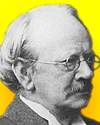 On 30 Apr 1897, at the Royal Institution Friday Evening Discourse, Joseph John (J.J.) Thomson first announced the existence of the electron (as they are now named). He called it a corpuscle, meaning "small body." On 30 Apr 1897, at the Royal Institution Friday Evening Discourse, Joseph John (J.J.) Thomson first announced the existence of the electron (as they are now named). He called it a corpuscle, meaning "small body." Thomson described his discovery and calculations that the particle of matter was a thousand times smaller than the atom. Although as director of the Cavendish Laboratory at the University of Cambridge, Thomson was one of the most respected British physicists, the scientists present found the news hard to believe. It had long been held that the atom was the smallest and indivisible part of matter that could exist. Nevertheless, the electron was the first elementary particle to be discovered. You can read Thomson's own words, as delivered at that meeting, in his paper, Cathode Rays, from the Proceedings of the Royal Institution, 1897. |
| Book of the Day | |
| |
| Quotations for Today | |
| | "When you are famous it is hard to work on small problems. This is what did Shannon in. After information theory, what do you do for an encore? The great scientists often make this error. They fail to continue to plant the little acorns from which the mighty oak trees grow. They try to get the big thing right off. And that isn't the way things go. So that is another reason why you find that when you get early recognition it seems to sterilize you." |
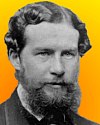 | "If we are ever in doubt about what to do, it is a good rule to ask ourselves what we shall wish on the morrow that we had done." |
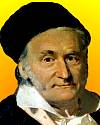 | "Mathematics is the queen of the sciences and arithmetic is the queen of mathematics. She often condescends to render service to astronomy and other natural sciences, but in all relations, she is entitled to first rank." |
| QUIZ | |
| Before you look at today's web page, see if you can answer some of these questions about the events that happened on this day. Some of the names are very familiar. Others will likely stump you. Tickle your curiosity with these questions, then check your answers on today's web page. | |
| Births | |
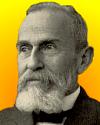 |  Eugen Bleuler, born 30 Apr 1857, was a Swiss psychiatrist, who introduced the now current term (1908) to describe the disorder previously known as dementia praecox. For his studies of this disorder, he was one of the most influential psychiatrists of his time. Eugen Bleuler, born 30 Apr 1857, was a Swiss psychiatrist, who introduced the now current term (1908) to describe the disorder previously known as dementia praecox. For his studies of this disorder, he was one of the most influential psychiatrists of his time. What name did Bleuler give to dementia praecox, by which is now known? What name did Bleuler give to dementia praecox, by which is now known? |
| Deaths | |
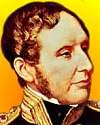 |  Robert Fitzroy (1805-1865) was the British naval officer who commanded the round the world voyage on which Charles Darwin sailed as the ship's naturalist. That voyage provided Darwin with much of the material on which he based his theory of evolution. When Fitzroy retired he devoted himself to meteorology. He devised a storm warning system that was the prototype of the daily weather forecast, invented a barometer, and published The Weather Book (1863). Robert Fitzroy (1805-1865) was the British naval officer who commanded the round the world voyage on which Charles Darwin sailed as the ship's naturalist. That voyage provided Darwin with much of the material on which he based his theory of evolution. When Fitzroy retired he devoted himself to meteorology. He devised a storm warning system that was the prototype of the daily weather forecast, invented a barometer, and published The Weather Book (1863).  What was the name of the vessel carrying Darwin that Fitzroy commanded? What was the name of the vessel carrying Darwin that Fitzroy commanded? |
| Events | |
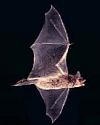 |  On 30 Apr 1960, the oldest banded U.S. bat was identified, from the date read on the band. It was a female little brown bat (the most abundant bat species in the U.S.) On 30 Apr 1960, the oldest banded U.S. bat was identified, from the date read on the band. It was a female little brown bat (the most abundant bat species in the U.S.) What do you think was the age of this oldest U.S. bat? What do you think was the age of this oldest U.S. bat? |
 On 30 Apr 1955, the element 101, was announced. It was named in honour of a scientist that contributed to the periodic table of the elements. On 30 Apr 1955, the element 101, was announced. It was named in honour of a scientist that contributed to the periodic table of the elements.  What is the name of element 101? What is the name of element 101? | |
 |  On 30 Apr 1897, at the Royal Institution Friday Evening Discourse, Joseph John Thomson (1856-1940) first announced the existence of electrons - as they are now named. Earlier in the year, he had made the surprising discovery of this particle of matter a thousand times smaller than the atom. He referred to it by a name he based on the Latin words for "small body." (Later, the electron became known by its present name, based on the Greek word for "amber.") On 30 Apr 1897, at the Royal Institution Friday Evening Discourse, Joseph John Thomson (1856-1940) first announced the existence of electrons - as they are now named. Earlier in the year, he had made the surprising discovery of this particle of matter a thousand times smaller than the atom. He referred to it by a name he based on the Latin words for "small body." (Later, the electron became known by its present name, based on the Greek word for "amber.")  What was Thomson's original name for the electron? What was Thomson's original name for the electron? |
| Answers |
When you have your answers ready to all the questions above, you'll find all the information to check them, and more, on the April 30 web page of Today in Science History. Or, try this link first for just the brief answers. Fast answers for the previous newsletter for April 29: Gene Shoemaker; Dutch; the number of chromosomes is the same in all body cells of a single species; the Kon Tiki; Erwin Schrödinger. |
| Feedback |
 If you enjoy this newsletter, the website, or wish to offer encouragement or ideas, please send feedback by using your mail reader Reply button. If you enjoy this newsletter, the website, or wish to offer encouragement or ideas, please send feedback by using your mail reader Reply button. |
--
If you do not want to receive any more newsletters, this link
To update your preferences and to unsubscribe visit this link
If you do not want to receive any more newsletters, this link
To update your preferences and to unsubscribe visit this link
! !



Δεν υπάρχουν σχόλια:
Δημοσίευση σχολίου